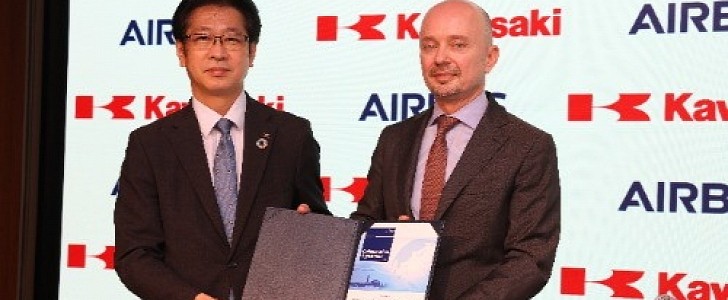The European aerospace giant Airbus is determined to turn its Zeroe emission-free aircraft concepts into reality as soon as possible. Another significant step on the path towards green aviation is the recent launch of a collaboration with Kawasaki Heavy Industries, considered Japan’s top hydrogen supplier.
The Zeroe aircraft concepts look interesting, but they would mean nothing without the supporting hydrogen infrastructure. Airbus announced in 2021 that it’s working on cryogenic tanks that could store large volumes of liquid hydrogen while also being able to withstand the immense pressure of the thousands of take-offs and landings that an aircraft would need to perform.
But that’s just one of the steps. There are many other aspects to consider, such as the supply chain, hydrogen transportation from the production site to airports, and its transfer to the aircraft tanks. These are some of the elements that Airbus and Kawasaki will study, according to the Memorandum of Understanding that they recently signed.
Kawasaki will bring its expertise in the development of hydrogen infrastructure, including liquefaction, transportation, storage, and transport to receiving terminals. The call is to create something named the Hydrogen Road, which is a strategy for connecting the production phase to the consumers’ market, with all the elements in-between.
As part of this collaboration with Airbus, the Japanese company will develop several infrastructure deployment scenarios regarding the best way to provide this fuel to specific airports. Airbus, on the other hand, will provide the data it accumulated in regards to fleet energy usage, aircraft characteristics, and other requirements for commercial operation.
“We strongly believe that the use of hydrogen - both in synthetic fuels and as a primary power source for commercial aircraft - has the potential to significantly reduce aviation's climate impact,” said Stephane Ginoux, Head of North Asia region for Airbus and President of Airbus Japan.
But that’s just one of the steps. There are many other aspects to consider, such as the supply chain, hydrogen transportation from the production site to airports, and its transfer to the aircraft tanks. These are some of the elements that Airbus and Kawasaki will study, according to the Memorandum of Understanding that they recently signed.
Kawasaki will bring its expertise in the development of hydrogen infrastructure, including liquefaction, transportation, storage, and transport to receiving terminals. The call is to create something named the Hydrogen Road, which is a strategy for connecting the production phase to the consumers’ market, with all the elements in-between.
As part of this collaboration with Airbus, the Japanese company will develop several infrastructure deployment scenarios regarding the best way to provide this fuel to specific airports. Airbus, on the other hand, will provide the data it accumulated in regards to fleet energy usage, aircraft characteristics, and other requirements for commercial operation.
“We strongly believe that the use of hydrogen - both in synthetic fuels and as a primary power source for commercial aircraft - has the potential to significantly reduce aviation's climate impact,” said Stephane Ginoux, Head of North Asia region for Airbus and President of Airbus Japan.






